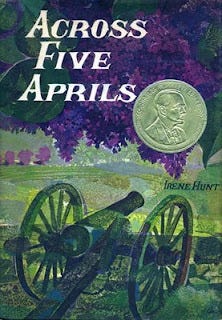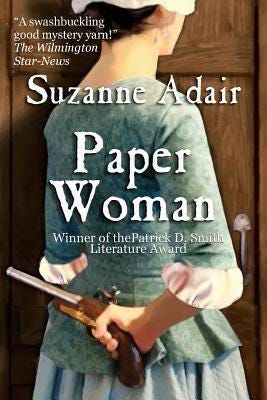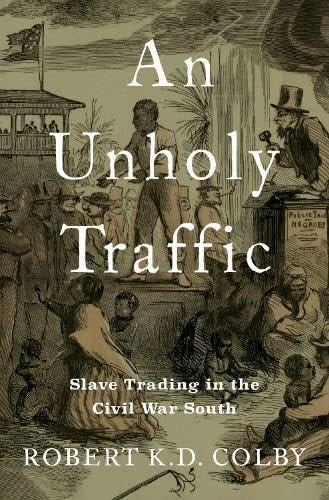Short Reviews for April 2025
Across Five Aprils, Paper Woman, An Unholy Traffic, The Blitzkrieg Myth
Across Five Aprils, by Irene Hunt (224 pp; 1964)
Who should read this? People who want an engaging picture of life growing up amid the American Civil War.
When I was a kid, I loved this kids' historical novel; I recently reread it for the first time as an adult, and I like it just as much now.
Structurally, it's a coming-of-age story for our young protagonist on an Illinois farm during the Civil War with his older brothers off in the army. He's left to follow the war, and local reactions to the war, while suddenly taking on new responsibility. The author intertwines beautifully rural Illinois life and the point-by-point news from the war.
It's a beautiful engaging picture, simultaneously lovingly nostalgic (the author's grandfather grew up on a farm like this, and it shows), and not shying away from the more painful parts (like when some neighbors vandalize the farm after one brother runs away to join the Confederacy). The details are very well done. We see things like how a political cartoon about McClellan's demotion could communicate so much, how rural feuds can escalate, how a remote farming family can treasure every bit of mail, and more.
At the same time, the characters here are so memorable they stuck in my mind ever since childhood for me to see them again here.
Paper Woman, by Suzanne Adair (246 pp; 2006)
Who should read this? People who don't care for characterization and want a bloody, ideology-free swashbuckling tale.
Our protagonist is a widow in Georgia during the American Revolution, a newspaper printer, who doesn't care one way or the other about independence but just wants the violence to stop. When her father is killed carrying a message involving American negotiations with Spain, she feels duty-bound to deliver the message (and associated valuables) to their rightful recipient despite all dangers and violence she faces along the way.
Unfortunately, I didn't think our protagonist's psychology was believable. She seems to be designed to get a modern-friendly independent woman (who runs her own life, is friendly with the local Indians, etc. - all things that're possible in that era, but unlikely all at once) rather than a plausible person of her era.
And, once she starts, she doesn't react realistically. She doesn't believe in any ideological cause, so I don't see why she was so dedicated to this mission that she'd repeatedly risk her life for it without apparent psychological response? She seems more of a convenient avatar for the plot than anything else.
On top of that, nearly every character totally lacks ideological commitment to either side. This isn't a book about the American Revolution; it's a book set amid the American Revolution that lacks everything I want to see in a book about it, and could almost be about any other war instead.
An Unholy Traffic: Slave Trading in the Civil War South, by Robert K.D. Colby (360 pp; 2024)
Who should read this? People looking to understand the Confederate mindset during the American Civil War.
Long-distance slave trading somehow continued to flourish in the Confederacy, even as its defeat became more and more apparent. Somehow, people were happy to buy slaves, in denial of the more and more obvious coming of emancipation. I found this hard to believe, but Colby repeatedly quotes their letters showing how firmly they were in denial.
I suppose I have to chalk this up to normalcy bias. Slaves had been a safe, profitable investment for decades - so they didn't think to notice how firmly that would change. I can half-understand the people who were looking to store their value in something not the inflationary Confederate Dollar (which, according to Colby, was quite common) - but literally anything else would've been a better purchase than slaves!
Sadly, this frantic last-minute trading meant many people driven away from their families. Colby's image of a rich slave-dealer trying to load his chained purchases on the last train out of Richmond - but failing - is a fitting epitaph for the Slave Power.
The Blitzkrieg Myth, by John Mosier (352 pp; 2004)
Who should read this? People familiar with World War II, who want to hear a controversial argument stance about the role of armor in the war.
The myth, Mosier argues, is the claim that Germany's conquest was thanks to a new method of fast, pointed armored-centric attack. Tanks, he argues, were never a pivotal point in an attack. Instead, he argues that most times such attack was tried by either side, it failed; and most gains were made by combined-arms broad-front attacks. The fundamental exception was the Battle of France, where (he argues) France only crumbled thanks to a lack of morale and Britain abandoning them to evacuate from Dunkirk.
Mosier does show that tanks weren't as good cross-country as thought; and that they didn't steadily advance faster than infantry could move. His analysis of German anti-aircraft guns (and failed early-war Allied bombing strategies) also appears insightful. Perhaps he's wrong here - but I don't know enough to refute him.
However, I find it hard to believe that so many generals on each side would have fallen prey to a mere myth about tanks. If there had been any general arguing against it, I'm sure Mosier would've quoted him - so I have to conclude there wasn't. Therefore, I conclude there's something he's left out.
My conclusion is that, despite everything Mosier claims, tanks were vitally anyway as part of that combined-arms attack. They were mobile fortified gun emplacements. Regardless of the actual speed at which they moved, I believe they prevented the trench stalemate of the last war. Perhaps (as Mosier argues) a line of forts could bring about stalemate anyway - but the difficulty was much higher than in the last war. Mosier doesn't mention this, but I think it's very significant.







